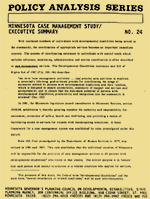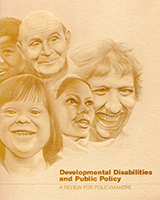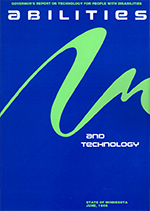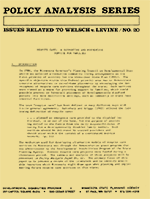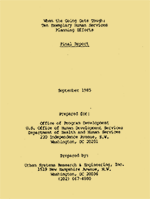The Minnesota Governor's Council on Developmental Disabilities
FORTY-FIVE YEARS OF HISTORY 1971-2016
This article, mainly covering 1982 – 1986, is the third of nine segments that will move the history along in five-year segments to bring the Council's work to the present. For context refer to this site's sections "Parallels in Time: A History of Developmental Disabilities" and "With an Eye to the Past" for laws, publications and other documents mentioned in text. In addition, the 2001 annual report includes a comprehensive history of the Council's early years. [https://mn.gov/mnddc/council/documents/2001rept-0.html].
A NEW WAY OF THINKING:
In the early 1980s, a decade after Public Law 91-517 mandated establishment of state councils, a sea-change began to occur in Minnesota regarding strategies for implementing the goal of deinstitutionalization and community integration for people with developmental disabilities.
Legal and legislative developments in 1980 and 1981; the Welsch Consent Degree (see 1977-1981 segment of this history), the Federal Omnibus Budget Reconciliation Act, Minnesota Rule 185, and the 1984 reauthorization of the DD Act (P.L. 98-527) were the factors leading to this "new way of thinking." The first ten years of the Council, part of the State Planning Agency, focused on the Regional Development Commissions. Funding recommendations that included planning initiatives and studies moved the Council closer to deinstitutionalization and public policies prompting the development of programs and services that would impact the lives of persons with developmental disabilities.
1981 OMNIBUS BUDGET RECONCILIATION ACT [OBRA]
In 1981 Congress passed the Omnibus Budget Reconciliation Act (OBRA) that offered states the opportunity to apply for three-year Medicaid waivers to fund services outside institutions for the elderly and individuals with disabilities at risk of institutional care. Future segments of this history will detail the long-term effects of this legislation, legal issues, and Council initiatives.
Future segments of this history will detail the long-term effects of this legislation, legal issues, and Council initiatives.
MINNESOTA RULE 185: Case Management
In 1981, the Minnesota legislature revised the 1977 case management rule that required counties to provide individual case management services to persons with developmental disabilities in their county of residence. The 1981 revision mandated that individual case management services include a needs assessment, a service plan and ongoing support.
The Council determined that, due to the growing numbers of individuals receiving services in the counties, their case management needs were often not being met. The Council awarded a grant to the Institute on Community Integration (University Affiliated Program) to determine the present views of case managers, and their recommendations on improving how they were meeting the individual's needs in the areas of advocacy, administration, monitoring and coordination of services. Issues that surfaced were the need for enhanced staff training and additional staff, additional funding, and developing a case management model that would address specific issues and lead to achieving an effective service delivery system for individuals. The most significant findings related to too much paperwork and staff shortages. (PAS #24 - Case Management Study https://mn.gov/mnddc/learning/document/GT053.PDF)
DEVELOPMENTAL DISABILITIES ACT OF 1984: Public Law 98-527
The 1984 reauthorization of the Developmental Disabilities Act included language that provided a new direction and desired outcomes for people with developmental disabilities – increased independence, productivity and integration in the community. These outcomes meshed with the direction in which the Council was already moving, helped to support and strengthen the Council's work, were more clearly defined, and emphasized community integration While a functional definition of developmental disability had been added in the 1978 reauthorization of the DD Act, People First Language was now used beginning with the passage of P. L. 98-527.
POLICY ANALYSIS SERIES AND PUBLICATIONS:
The Policy Analysis Series on implementation issues under the Welsch Consent Decree helped to inform the disability community, service providers, and people with developmental disabilities and families about the progress of deinstitutionalization and the process of community integration.
The Welsch series included papers on deinstitutionalization, respite care and employment, and the use of technology; showed the impact of grants and research studies; what activities and programs were successful; and where policy changes were needed in the areas of family support, supported employment, technology and, most importantly, case management.
One publication, Developmental Disabilities and Public Policy: A Review for Policy Makers (January 1983) was delivered to state legislators by constituents involved in developmental disability issues and, "…provided information about persons with developmental disabilities, trends in community services, and policy issues and alternatives for the 1980s." (https://mn.gov/mnddc/learning/document/GT015.PDF)
The results of the work undertaken by the Council in the early 1980s with the discussions and resolutions that came out of the policy analysis work were shared in the January 1987 publication, A New Way of Thinking.
This publication reviews the history of service changes for people with developmental disabilities and provides the context for a new policy perspective. Quality services are responsive to basic and individual needs, and recognize that, first and foremost, people with developmental disabilities are people with abilities. They are more alike than different from people without disabilities. New ways of thinking about how, when, and with whom people with developmental disabilities learn, live, and work are discussed. New service and funding strategies and examples of alternatives to traditional approaches are included (mn.gov/mnddc/extra/publications/new_way_of_thinking.pdf).
MCKNIGHT FOUNDATION GRANT:
In 1982, the Council received a McKnight Foundation grant that totaled $1 million and funded:
- Regional projects and workshops to identify problems that impacted the communities served; and find solutions.
- Seventeen day programs to increase employment.
- Workshops and projects for persons with autism or epilepsy.
- Management development and training for direct support staff.
The Assistive Technology Project, also funded with a McKnight Foundation grant, looked at how advances in technology are improving the quality of life or people with disabilities. Training in assistive technology gave people more self-control over various aspects of their lives. The Policy Analysis Paper on this project, issued by the Council in 1984, documented not only the research and strategies of the project but also, importantly, the outcomes. In 1985 Governor Rudy Perpich appointed a team to study this issue that eventually contributed to the Technology Related Assistance for Individuals with Disabilities Act of 1988 (mn.gov/mnddc/learning/document/GT039.PDF).
MORE PROGRAMS & PROJECTS:
Council grant funds were used for programs and projects that would both support the new strategic planning efforts and also carry forward the movement of individuals with developmental disabilities out of institutions and into community living.
Federal funds supported a Respite Program that established family support services and dissemination of information on available services to families. The Policy Analysis Paper on this program documented the positive results for the Respite Program and, "…laid the groundwork for a number of system changes in caregiver support and the use of Medicaid funding". (PAS #20 Respite Care: A Supportive and Preventive Service for Families (https://mn.gov/mnddc/learning/document/GT025.PDF)
Public hearings held in 1982 identified two areas of greatest need for persons with developmental disabilities living in communities. They were, "assistance to work with people who have behavior problems and finding employment in the community for people with developmental disabilities."
From 1983 to 1986, eighteen projects that broadly focused on improving staff training and support programs for people at the programs, were funded. Employment training was also enhanced and supported work projects were increased. The outcomes cited were increased income and the benefit of community contacts. Fewer behavior problems were seen when people were employed.
In 1985, the Office of Special Education and Rehabilitative Services (OSERS) funded the Minnesota Supported Employment Project.
In 1986 Public Law 99-506 (Amendments to the Rehabilitation Act) made grants available to states for supported employment for people with severe disabilities.
RECAP:
By 1986 the Council was recognized as one of ten outstanding agencies in the report, "When the Going Gets Tough: Ten Exemplary Human Service Planning Efforts", issued by the U.S. Health and Human Services Department. The Council was seen as demonstrating the, "…distinctions between merely making plans and true strategic planning" (mn.gov/mnddc/learning/document/GC028.PDF).





